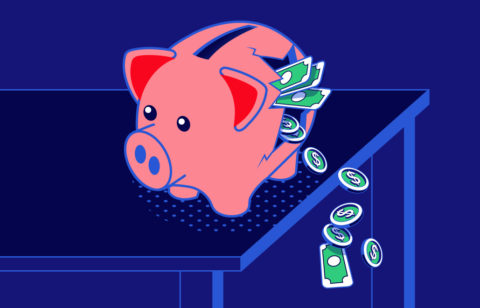Learning to manage your money wisely is perhaps the most important financial skill regardless of how much you earn. In fact, many people with a six-figure income struggle financially because they lack the skills to save and spend wisely. In most cases, financial success involves learning and implementing personal finance management skills correctly.
While earning more can make achieving success easier, it is still not a guarantee. If you take home a big paycheck but cannot control your spending or you fail to track where the money goes, you may feel like you are living from paycheck to paycheck. News alert: you could still fall into debt.
Data from the Census Bureau reveals that over 91 million Americans consider it “somewhat difficult” or “very difficult” to afford typical household expenses. In addition, a 2022 LendingTree survey indicates that 32% of Americans had paid a bill late in the previous six months. Unfortunately, many adults lack financial literacy because they were not taught this important topic while growing up.
Luckily, there are many free tools and articles online that teach the basics of personal finance. If you are a bookworm, you can learn from personal finance books—many of which go into detail about money management. If you are an auditory or visual learner, you can find podcasts or video series.
6 signs you learned to be a smart money manager
Money management skills may come naturally to some people, but others must develop them through discipline and dedication. Want to find out how financially competent you are? Here are six signs to look for:
1. You have a budget
A budget enables you to see your income and expenses and helps keep your finances in check. You can make financial decisions based on this data and adjust accordingly when your spending surpasses the funds coming in.
2. You plan for major expenses
Impulsive spending is financially unhealthy, and it can easily put you in debt. So, if you want to manage your finances well, you must learn to plan and save for big expenses and other major financial decisions. It is imperative that you know where the money is coming from. If the expense can be paid for in the future – like retirement – you can save up for it little by little. This will help you avoid debt and keep your finances secure.
No matter how much money you do or don’t have, an emergency fund is a must. It can protect you when the unexpected happens. For instance, you suddenly need to replace your roof, which could cost thousands of dollars. This situation is exactly what an emergency fund is for. You have the money available when you need it so that you don’t need to borrow and go into debt.
People Also Read
3. You save in advance to meet your goals
You are going to encounter milestones and events that will require a lot of money. A wedding, a house, college for a child, retirement – these all require planning in advance. If you aren’t financially prepared, there is a good chance you would have to go into debt. And that is the last thing you want to do!
There are special financial plans set up to help people achieve their goals. A 529 college savings plan can help you save while also presenting tax advantages. Retirement is easier to plan and pay for by investing in your company’s 401k or opening an IRA. The sooner you get started; the more money you will have thanks to compound interest.
If you are working with limited funds, even $20 a month is better than nothing. The money will add up over time and get you closer to living life on your terms.
4. You track your spending
Many people end up in debt because they spend beyond their means. If your expenses add up to more than your income, the difference will be paid through borrowed money. If you want to make smarter spending choices, you should ensure your expenses are tracked and covered. Doing so can help you determine which ones are required and which ones may be unnecessary.
5. You allocate money for entertainment expenses
You might be surprised at how much entertainment expenses can eat into your budget. Although this is not a necessity, spending money on your passions or hobbies can help you de-stress and increase the positivity in your life.
According to data from BLS.gov, entertainment ranks #6 on the list of where U.S. households spend their money. The annual average expenditure in this category took a dip in 2020 due to the COVID-19 pandemic but rebounded the following year. If you could afford to indulge in entertainment expenses to make up for the sporting events, concerts, and social outings that were put on hold during the pandemic, your finances are most likely in good standing.
6. You borrow smartly
There is essentially no way to avoid debt altogether unless you are independently wealthy. A mortgage is a debt. But it is considered good debt because it is an investment that will likely go up in value over time. An auto loan is a bad debt because the vehicle loses value the moment you drive it off the lot.
Some recommendations include finding the best rate on your mortgage and considering fixed payments if inflation is in the picture. You can compromise to purchase the car you want: buy it used. That way, the previous owner incurred the loss in value.
On the other hand, do not borrow money for something you don’t necessarily need. If your current couch isn’t in shambles and it’s comfortable, don’t go into debt by purchasing a new one. The compromises you make today can fund your tomorrow.
Benefits of managing your money well
By getting your finances in order, you can enjoy financial security and avoid debt:
Easier decision-making
Managing your money well means having a clear picture of your finances. This knowledge is key to helping you make better financial decisions. If you see something you want to buy, you can easily determine whether or not you can afford it. If you can’t pay in cash or can’t cover the credit card charge at the end of the month, don’t buy it. Emergencies are the only exception.
Avoiding mistakes
Your ability to manage money can help you avoid mistakes that could put your finances at risk. For example, it can keep you from borrowing large amounts of money you cannot afford to pay back or making unnecessary purchases.
Planning for the future
Since money management provides an understanding of your financial situation, you are in the best position to plan for your future. In fact, there are financial plans you can use in your money management efforts. These are the very same plans that will help you meet your financial goals.
Reaching your goals
Your ability to plan for the future will get you closer to reaching the goals you have set for yourself. You can easily monitor your progress to determine which spending habits and behaviors can get you there. It is also important to determine what, if anything, is holding you back.
Setting a good example
If you have kids, you can teach them the basics of spending and saving. By managing your money wisely, they will subconsciously follow your behavior. For example, if you pay for everything you can in cash, the odds are that they will too.
Reducing money stress
One of the most important benefits of managing your money well is minimizing stress.
According to the American Psychological Association (APA), money continues to be one of the top reasons why Americans feel stressed about their lives. We all know that tension can lead to problems – especially health issues. One of the best ways to avoid it involves making smart financial decisions.
If you are struggling with debt and need help managing your finances, National Debt Relief can help. We work with you to resolve your debt and graduate with knowledge that can help you afford the life you deserve.









